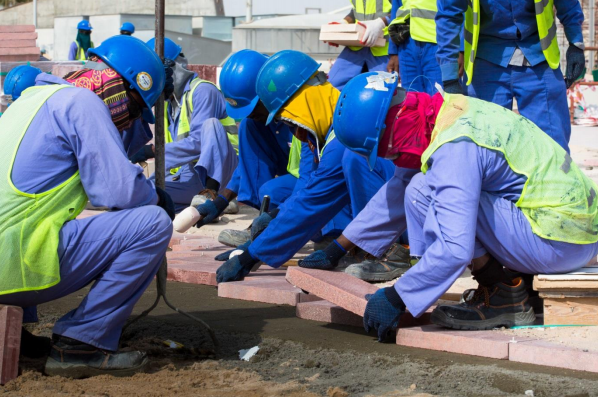Some of Qatar’s World Cup contractors were audited by an independent body. Here are their findings and what's to come.
16 April 2017
| Last updated on 17 April 2017
A recent audit of contractors working on the 2022 World Cup projects found that many of the employees are being overworked.
For instance, five out of 10 contractors assessed didn’t give their staff at least one day off a week. Even worse, many of the construction workers had 72-hour weeks as opposed to the max of 48 hours agreed upon.

With concerns about human rights violations in Qatar growing around the world, the Supreme Committee for Delivery and Legacy (SCDL) sought assistance from Impactt, a London-based ethical trade consultancy, in 2016. They have just released their independent findings in the Annual External Compliance Report.
Compliance
For contractors and sub-contractors to be able to obtain tenders for any World Cup project, they had to agree to follow the worker’s charter. The topics covered in the charter include living conditions, ethical recruitment, nutrition, health and safety.
Throughout the past year, Impactt interviewed 10 different contractors as well as 253 workers in order to find out if the charter was being followed.
Results
Impactt found that companies mostly respected the rules about housing and safety, but not so much in aspects such as adequate rest and complaint procedures. The working day is supposed to be eight to 10 hours, but many employees had to work for 18 hours.
SEE ALSO: Qatar is spending $500m a week on World Cup preparations
However, it stated that they did a follow-up audit this January and the majority of issues were either resolved or progress has been made in resolving them, such as medical care, transportation and end-of-service procedures.
It’s important to note that these improvements are restricted to World Cup project workers, which make up only just a fraction of the country’s blue-collar workforce.

Improvements needed
To conclude the report findings, Impactt has made recommendations for things contractors should improve and they mostly have to do with the company culture. Some of those include:
- Amplify workers’ voices
- Build management skills
- Ensure that contractors, rather than workers, pay the cost of recruitment
- Ensure that contractors run effective worker representation systems and grievance mechanisms
SEE ALSO: GCC countries to implement VAT in 2018
Future audits
Throughout the next year, every single contractor in nine active World Cup projects will also be audited for charter compliance and at least five per cent of the workers will be interviewed.
A worker hotline will be set up by the SCDL for complaints. The SCDL will also do a worker survey and continue to collaborate with unions on health and safety inspections.

Human rights record
On a broader scale, Qatar has been under scrutiny for human rights violations. A UN agency has given the country until November to address allegations of forced labour. Once the International Labor Organization (ILO) convenes towards the end of the year, it will decide whether they should open a Commission of Inquiry into the situation or not.
Investigations into these allegations have been ongoing since last year and the ILO has previously visited Qatar to inspect the working conditions.
SEE ALSO: Qatar approves draft law to protect domestic workers
This is the second time Qatar has been given time to resolve the issue. There were some labour reforms that took effect in December, but they did not abolish the controversial exit permit system or the No Objection Certificate (NOC) needed for changing jobs.
There are pending pieces of legislation that are meant to safeguard workers, including the Wage Protections System (WPS) and a draft law that protects domestic workers.
- Tags:
- qatar
- workingconditions
- worldcup





.jpg?itok=4utim_xh)































.jpg?itok=OdfWVChW)
.png?itok=3d-9ov-m)




















































.jpg?itok=huYiXiog)

.jpg?itok=WvzOqcwJ)


.png?itok=6xLVeUta)













